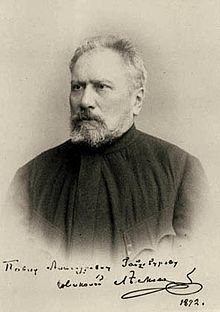The juggler pamphalon
The juggler Pamphalon ( Russian Скоморох Памфалон , Skomoroch Pamfalon ) is a story by the Russian writer Nikolai Leskow , which appeared in the March issue of the journal Historischer Bote in 1887 . The author took the material for this early Christian legend from the prologue , the Slavic version of a Synaxarion for the city of Constantinople . The narrator calls himself “the copyist of the legend”.
content
At the time of Theodosius the Great , the governor Hermias resigns from his offices in protest against the slanderers and hypocrites around the emperor . After the death of his wife, he releases his slaves, sells his property and gives the proceeds to the poor. He leaves Constantinople, wanders to Edessa and climbs a column near a village on the edge of the desert, on which he stands for many years. The sinister and silent pillar saint is fed by the villagers. Hermias is desperate because he has not met anyone in his life who has been pleasing to God . After thirty years on the pillar, God finally speaks to him: “You are in the wrong, Hermias, if you are grieved and appalled: There are people who are pleasing to God and are in the book of eternal life ... descend, Hermias, ... you must go to Pamphalon. ”So he gets down from the pillar and goes to Damascus .
Pamphalon is a juggler who fed his mother with his juggler's trade. Among the hetaera Pamphalon entertains rich idlers for money with his jokes. Pamphalon cannot chat with Hermias about what is important to him, he doesn't have the time. He returns to his pillar disappointed. But immediately the desert wind sent by God blows him back to Damascus to Pamphalon. God rules on the saints: "Do not go away from the Pamphalon, ask him to tell you how he did the work of his salvation."
Pamphalon now tells Hermias the story of the young and beautiful Damascus Magna, who was married to the Byzantine Rufinus by her parents against her will. After a long, unhappy marriage, she was separated from her heavily indebted husband and children and sent to work for a hetaerae. Pamphalon fell in love with Magna there. When he was modestly prosperous through a gift of money from a customer, Magna wanted to indulge in Pamphalon. In return for the night of love, he should buy her relatives free. Since Pamphalon's money was not enough, the hetaera helped him out with the missing sum at his request.
Hermias realized in Damascus that even a person whom the world despises can reach the kingdom of heaven thanks to his mercy . Hermias returns to his pillar, but he no longer climbs it. He becomes a goatherd and teaches the children of the village.
Adaptation
- 2003 Jobst Langhans directed Pamphalon, Juggler for Michael Chekhov Studio Berlin .
German-language editions
- The juggler pamphalon . Translated from the Russian by Ruth Hanschmann. In: Nikolai Leskow: The way out of the dark. Stories. Dieterich, Leipzig 3rd ed. 1972. pp. 370–451. (Dieterich Collection. 142.)
- The juggler pamphalon . Narrative. Translation and afterword by Johannes von Guenther . Stuttgart, Reclam 1983. (Reclams Universal-Bibliothek.) (Several editions) ISBN 978-3-15007788-7
Output used:
- The juggler pamphalon . German by Günter Dalitz. In: Eberhard Reissner (ed.): Nikolai Leskow: Collected works in individual volumes. Rütten & Loening, Berlin 1971. pp. 408-476.
Web links
See also
Individual evidence
- ↑ Russian Исторический вестник
- ↑ Russian prologue (book)
- ↑ Nikolai Leskow: The juggler Pamphaleon. Berlin edition 1971. p. 476.
- ↑ p. 415
- ↑ p. 439
